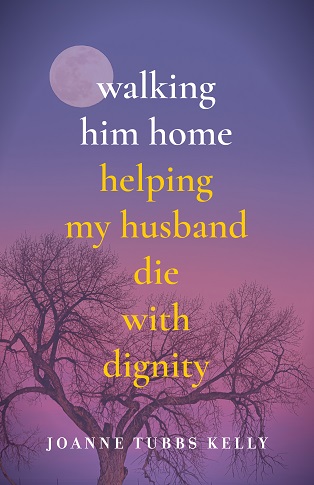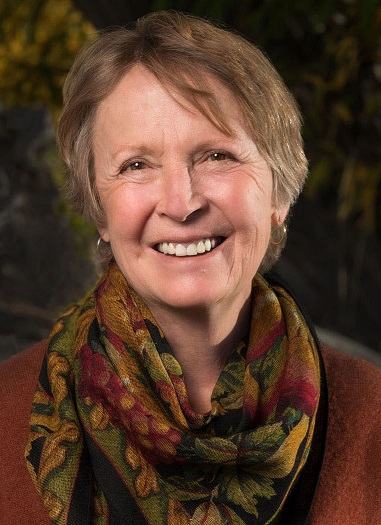I love reading memoirs. I think it satisfies some curious, voyeuristic tendency in me. I want to know how other people live, what motivates them, what struggles they face.
Joanne Tubbs Kelly – 9 August 2022
The Back Flap
Alan and Joanne marry in midlife and live a happily-ever-after existence until, at sixty-nine, Alan is diagnosed with a rare, fatal, neurodegenerative illness. As he becomes increasingly disabled and dependent on others, and decreasingly able to find joy in life, he decides he wants to end his suffering using Colorado’s Medical Aid in Dying law.
About the book
What is the book about?
This memoir is about a loving marriage between Alan and Joanne and about the anguish the couple feels when Alan is diagnosed with a fatal neurodegenerative illness. Alan decides he wants to use Colorado’s End-of-Life Options Act to end his life on his own terms instead of waiting for his illness to completely disable him. Joanne desperately wants Alan to live as long as possible, but when he asks for her help applying for medical aid in dying, she can’t say no.
When did you start writing the book?
I started writing this book several years before Alan was actually diagnosed. We both knew something was horribly wrong with Alan, and from my Google research, I knew the outcome was likely to be grim. At the time, I wasn’t sure exactly where I was going with the story, but I felt it was important to capture vignettes that would help me remember the journey, the ups and downs and struggles along the way. I joined a writing group, read dozens of memoirs, and took classes on memoir writing to hone my skills
How long did it take you to write it?
About five years total, but the first three of those years I was also taking care of an ailing husband. And the last two years I was also grieving his loss, which takes a lot more out of a person than I had ever realized.
Where did you get the idea from?
When I am faced with a new situation, I always have looked for books on the topic so I can learn how other people have navigated the situation. But when Alan decided to use medical aid in dying, I couldn’t find a book about a husband-wife team who walked this path together. That’s when I knew what my book was about.
Were there any parts of the book where you struggled?
I struggled with how much of the medical hoopla to include. Initially I just wrote it all, figuring I could cut it later. I asked numerous early readers to tell me what I should leave out, and nobody suggested omitting the medical details. Which surprised me. I ended up including most of it.
What came easily?
Writing about my funny, kind, and loving husband was the easy part, especially before his health took a downturn.
Are your characters entirely fictitious or have you borrowed from real world people you know?
My characters are all real, as this is a memoir. I obscured the identity of a few people, hoping it would keep me out of trouble, but the actual events and dialog were as close to the truth as memory allows.
We all know how important it is for writers to read. Are there any particular authors that have influenced how you write and, if so, how have they influenced you?
I love reading memoirs. I think it satisfies some curious, voyeuristic tendency in me. I want to know how other people live, what motivates them, what struggles they face.
It feels quite presumptuous on my part to say that I am influenced by Elizabeth Alexander, the poet who read at Obama’s inauguration. Her memoir, The Light of the World, is one of my favorites. She uses such beautiful language. I lent my copy to a friend, who called it “poetry in disguise.” I aspire to writing as beautifully as Elizabeth.
Other favorite memoirs: Refuge by Terry Tempest Williams; Half Broke Horses by Jeanette Walls; Liar’s Club by Mary Karr; The Bright Hour by Nina Riggs; The Year of Magical Thinking by Joan Didion; Wild by Cheryl Strayed.
Do you have a target reader?
- People nearing the end of their lives who want to think about the choices they may need to make to die in alignment with their values
- US and Canadian adults over the age of 65 with some college education
- Book groups in states that are considering passing medical aid in dying legislation
- Spouses of people with terminal illnesses
- Spouses of people who have already died using medical aid in dying
- Professionals in medical, palliative care and hospice organizations who would like a clearer understanding of the spousal experience when one of their patients/clients choses medical aid in dying
About Writing
Do you have a writing process? If so can you please describe it?
I’m not sure this counts as a process:
I sit down at my desk to write. I completely lose track of time. I get grumpy if my phone rings. All of a sudden, the day is gone.
Do you outline? If so, do you do so extensively or just chapter headings and a couple of sentences?
I do not outline ahead of time. After I have a rough draft, I take a step back and figure out how the pieces should be arranged.
Do you edit as you go or wait until you’ve finished?
Both. For me, writing is an iterative process. I might go back and work on the same passage a dozen times before I am ready to call it finished.
Did you hire a professional editor?
Yes, I hired two different professional editors. The first one did a splendid developmental edit relatively early on. Boiled down, her feedback consisted of three words: Show, don’t tell. So, I went back to work on my manuscript. As I neared the end, I hired another editor, and my only question to her was “What should I leave out?” She gave me some good advice, but had few suggestions for leaving anything out. I think both of them were worth what they charged, and both of them helped me improve my manuscript.
Do you listen to music while you write? If yes, what gets the fingers tapping?
I don’t listen to music when I write. I am a big fan of quiet.
About Publishing
Did you submit your work to Agents?
Yes, I spent months submitting query letters to agents. I had one tiny little nibble where they asked for my first 50 pages, but that was it. As someone who was trying to publish her first book at the age of 70, I don’t think I was very attractive to agents. And everybody knows that “death doesn’t sell.”
What made you decide to go Indie, whether self-publishing or with an indie publisher? Was it a particular event or a gradual process?
I was getting really discouraged with the lack of interest from agents. That’s when I hired my first editor. I was worried that my manuscript had a flaw that was turning agents off and thought maybe it was something I could fix. So, I improved my manuscript and was getting ready to go back to the slog of querying agents when I discovered She Writes Press, a hybrid publisher.
Did you get your book cover professionally done or did you do it yourself?
She Writes Press designed my cover, using a photograph taken by a friend on the night of Alan’s memorial service. I absolutely love my cover design.
Do you have a marketing plan for the book or are you just winging it?
I hired a PR firm to help me get the word out on my book, but my marketing efforts are mostly through social media. I have learned a lot about book marketing through my sister writers at She Writes Press.
Any advice that you would like to give to other newbies considering becoming Indie authors?
If you have never published a book before, I would recommend you consider partnering with a reputable hybrid publisher (like She Writes Press). It is not cheap, but they will help you put out a professional-looking product and you will learn a ton about the publishing process. She Writes Press encouraged us to meet together with other authors in our cohort, so we have a built-in support group and cheerleading squad to help us get through the rough spots.
About You
Where did you grow up?
We moved a lot when I was growing up, but settled in Oneonta, New York, when I was in sixth grade. So, I consider Oneonta to be “home.”
Where do you live now?
I live in beautiful Boulder, Colorado.
What would you like readers to know about you?
I am happiest with garden dirt under my fingernails and a bouquet of peonies on my dining room table. During the winter months, I am happiest with a book in my lap and a cup of tea at hand.
What are you working on now?
I am working on finding my way in life. I lost my beloved husband in January 2020, my sister in August 2020, and my son in February 2022. I am still coming to terms with all this loss.
Miscellaneous
Given the chance, I would like to make clear that medical aid in dying offers people with a terminal diagnosis a choice in how they die, not whether they die. It is not a means of suicide. Medical aid in dying is currently available in 11 jurisdictions in the US (10 states and the District of Columbia) to people with decisional capacity (the ability to make good decisions in their own behalf), a life expectancy of 6 months or less, and the ability to self-administer the life-ending cocktail.
End of Interview:
For more from Joann Tubbs Kelly visit her website, check out her blog for more about medical aid in dying, and like her Facebook page.
Get your copy of Walking Him Home from Amazon US or Amazon UK.


